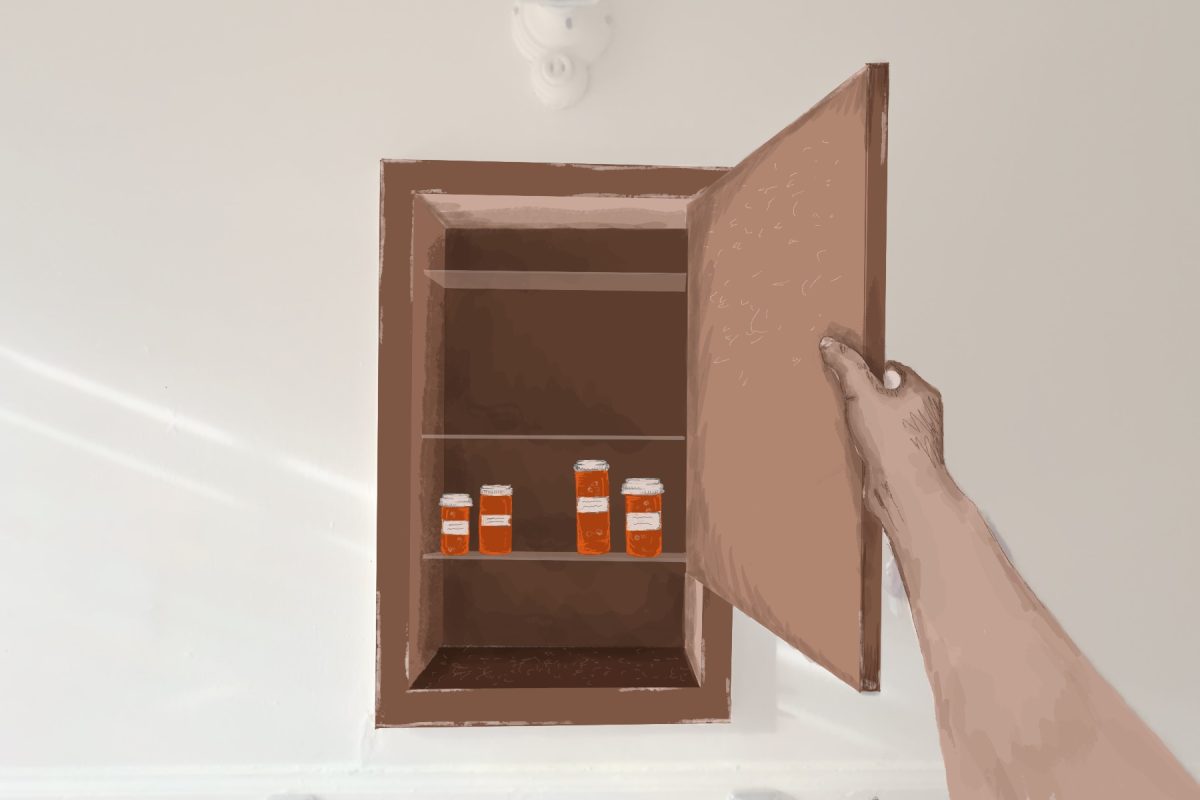
Sarah Hoffer, Graphic Illustrator
I visited my doctor for a routine checkup, but paused for a second when I was asked the question I dreaded most — “What medications are you taking?” I took stock of all the medications sitting on my dresser, my face flushed as I listed my prescriptions prescribed for my mental health. After the appointment, I wondered why this experience had been so embarrassing.
Despite my confusion about my own embarrassment, I am not alone.
According to the CDC, in 2020, 16.5% of adults in the United States were taking medication for their mental health. While the conversation surrounding mental health has improved, there’s still a part of mental health that everyone seems uncomfortable talking about: medication.
One look at TikTok or Instagram reels will tell you that medications for mental health continue to be stigmatized. Some users claim that no one needs mental health prescriptions, as a walk or exercise would be more effective. Even those who have no issues with others taking mental health medications believe that it should be limited to severe circumstances.
This advice, which experts have found misleading, is not just limited to social media. Robert F. Kennedy Jr., the Secretary of Health and Human Services, has gone on record to say that mental health medications used to treat depression and ADHD lead to higher rates of violence, although this is an unfounded claim.
Evelyn Lassiter, a third-year student studying communication at the University of North Carolina at Charlotte, has seen this firsthand through personal involvement with the National Mental Health Alliance.
“People think that [taking medications is] just the easy way of battling what you’re going through,” Lassiter said. “People also think that it’s just, oh, you don’t want to talk about your emotions, you don’t want to feel those, so you just run to something that’s a temporary [defense].”
Addison Clark, a graduate student at the UNC School of Pharmacy, said this stigma may be due to a lack of physical symptom presentation.
“You can get a staph infection on your arm and clearly see with your own two eyes that you have a bacterial infection, but someone with depression and anxiety or even OCD, whatever, chances are that […] they’re able to hide that when they’re out in public,” Clark said.
Mental health medications are not something to be ashamed of. In today’s age of, “mental health matters,” it is contradictory that people in the highest positions of power are actively portraying taking mental health medications as the easy way out, dangerous and shameful. This rhetoric has the potential to prevent people from seeking help.
While taking mental health medications is a personal choice, a factor preventing someone from taking them should not be unfounded claims linking them to violence. Mental health medications work similarly to any other medicine — to help people feel better.
For mental health medications to be less stigmatized, we need to start talking openly about experiences with them. An act as simple as talking with close friends about experiences with medications have the ability to make a difference.
Lassiter thinks the best way to stop the misperception of mental health medications is to give people a safe space to talk about their experiences.
“[Destigmatization] really does start in a small group of people,” Lassiter said.
Clark said people should reframe their concerns surrounding mental health medications into something positive. She suggests that people will not stop being who they are but have the opportunity to interact with the world around them in a healthier manner.
Another way to combat the stigmatization is by talking to your doctor or psychiatrist. They should be able to give the most accurate information about the medications that they are prescribing. While anecdotal evidence about medications from the internet may be helpful, the majority of people with a TikTok account do not have a medical degree. Therefore, the most advantageous course of action is to make sure you are on the medications that make you feel the best.
Ultimately, for the stigmatization of mental health medications to stop, people need to treat them like they would any other prescription. I doubt taking ibuprofen for a broken wrist would be considered taking a shortcut or shameful. We should not be treating mental health any differently. The next time I go to the doctor, I will hold my head high when I list my mental health medications. At the end of the day, like all medicines, they help you stay healthy.